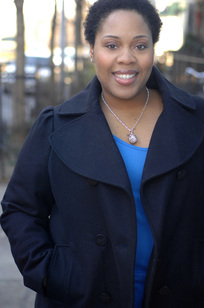 JACQUELINE LAWTON: To begin, can you tell me how long have you been acting? What was the first play that you ever worked on as an actor? What did you learn from that experience that remains with you today? ASHLEY SPEARMAN: I have been acting for about 14 years. The first play that I ever worked on was Christopher Durang's 'Dentity Crisis, I played Edith. Prior to working on that show I had taking acting classes for about two years. Each day of the rehearsal we would have to come in with a completely different choice and voice for the character. There were also times when we were asked to swap, and take on the choices and voices of other characters. This was a great exercise because it forced me to get out of my head and be fully present in the scenes. This experience taught me the importance of trust, vulnerability, and personal awareness. Being able to trust my cast mates, giving myself permission to play, explore and discover, and being aware of my emotions/ being. JL: Why did you decide to get into theater? Was there someone or a particular show that inspired you? AS: I always had an interest in acting I just never had the opportunity to explore that interest until I got to college. I took my first acting class during the summer after my freshman year at Freedom Theatre here in Philadelphia, and I have been doing theatre since then. It just felt like home. There wasn't a particular show that inspired me so much as it has been my acting teachers and the actors themselves. Watching them work through their struggles and witnessing their breakthroughs, have inspired me to dig deeper and go further in my own work. JL: Set in Hampton, Virginia in the 1940s, THE HAMPTON YEARS examines the impact of World War II on Jewish immigrants living in the United States and their role in shaping the lives and careers of African American students in the segregated south. This play investigates the various ways in which racism and bigotry negatively impact the arts, academia and military. Where do you feel we are in terms of race relations in the U.S.? AS: I feel like the subject of race is often swept under the rug by the dominant culture. To often when race is discussed Africans Americans are always put in a position where we have to either explain or defend our worldview. JL: THE HAMPTON YEARS also celebrates and honors such extraordinary artists as John Biggers, Elizabeth Catlett, Samella Lewis, Viktor Lowenfeld and Charles White for their bold and courageous ability to overcome these challenges and create beautiful, powerful and lasting works of art. Why do you feel this play is relevant to today audiences? AS: This play is relevant because we can always learn and draw inspiration from the trial, and triumphs of those who came before us. JL: Which character are you playing? What, if anything, do you have in common with this character’s passions, values, intentions or belief system? AS: I am playing Samella Lewis. The one thing that we have in common is our strong connection family and culture. A lot of her art was in many ways autobiographical. Learning about her story reminded me of some of the stories that I heard from my grandmother of her southern up bringing. JL: If there is one thing you want audiences to walk away knowing or thinking about after experiencing THE HAMPTON YEARS, what would that be? AS: The only limits that exist in life are the ones that we place on ourselves. JL: What’s next for you as an actor? Where can we follow your work? AS: Right now I am working on new material for next year’s graduate auditions. I’m keeping my fingers crossed.
0 Comments
Your comment will be posted after it is approved.
Leave a Reply. |
My BlogI'm a playwright, dramaturg, and teaching artist. It is here where you'll find my queries and musings on life, theater and the world. My posts advocate for diversity, inclusion, and equity in the American Theatre and updates on my own work. Please enjoy!
Categories
All
Archives
June 2020
Reading List
|
